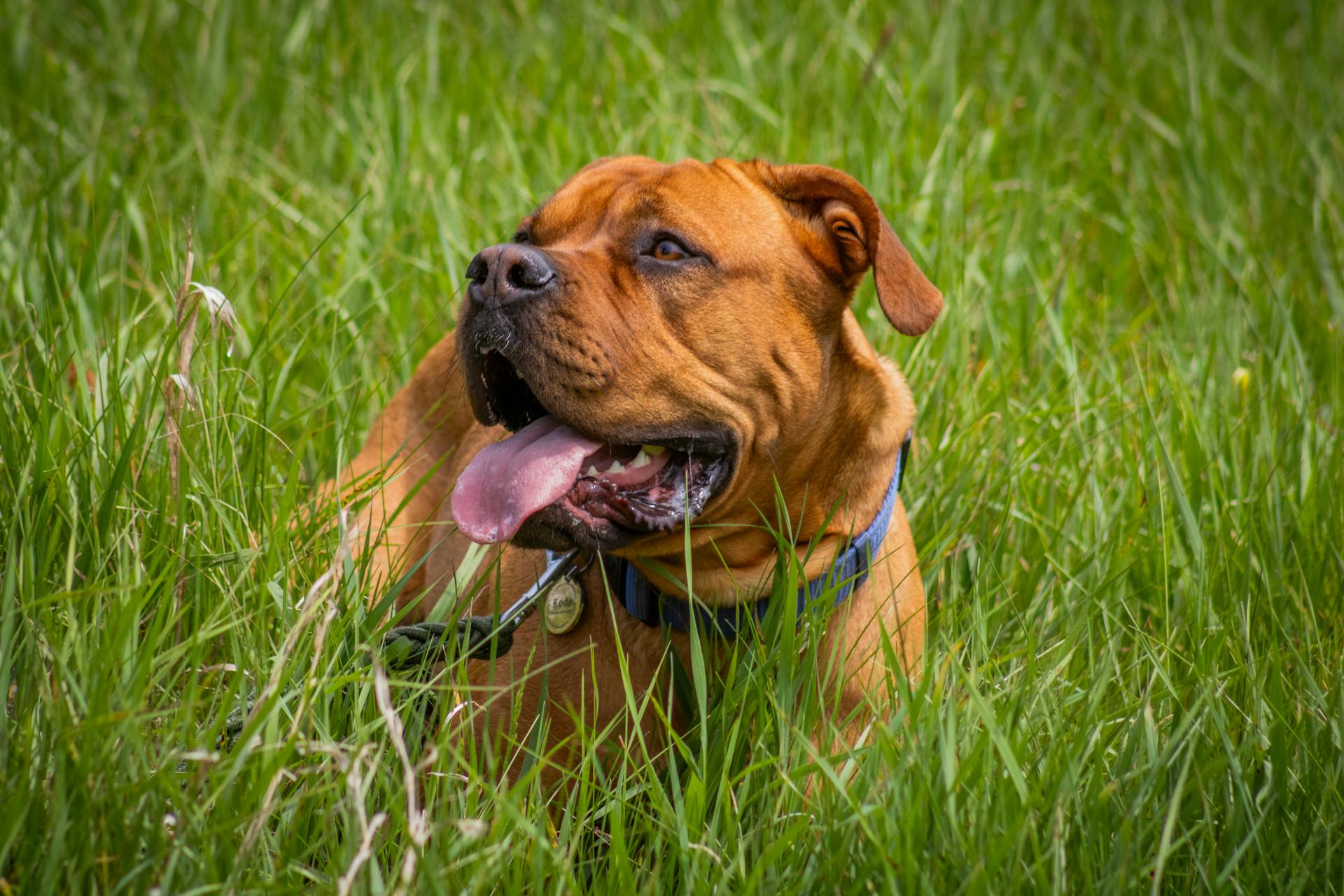
Weimaraners are often misunderstood as being dim-witted, but the truth is, they're actually one of the smartest dog breeds around.
Their intelligence is often ranked among the top 10 most intelligent breeds, according to Stanley Coren's book "The Intelligence of Dogs". This is because Weimaraners are highly trainable and can learn quickly.
Their problem-solving skills are also impressive, allowing them to figure out puzzles and challenges with ease.
Weimaraner Basics
The Weimaraner is a highly energetic breed that requires a lot of exercise and attention. They have a deep need to hunt and connect with their human family.
Their ancestors were bred to hunt deer, wolves, and even bears, so it's no surprise that they're naturally inclined to be active. They'll love nothing more than to spend the day hunting with you, or participating in canine sports.
Weimaraners are incredibly intelligent and loyal dogs who bond deeply with their owners. They're known to attach to their owners like Velcro, which can be both a blessing and a curse.
Weimaraner History
The Weimaraner breed has a rich history that dates back to the early 19th century in Germany. The Grand Duke of Weimar was the driving force behind the creation of this breed, seeking a dog that was bold, fearless, intelligent, and an excellent hunting companion.
Weimaraners were bred to be skilled hunters, using their acute senses to detect and point at their prey, leading their human hunting companion in the right direction. This skill was particularly useful in Europe, where hunting big game like wolves, bears, and mountain lions was a common practice.
The American Kennel Club recognized Weimaraners in 1943, and they quickly gained popularity among big game hunters. President Eisenhower and actress Grace Kelly were both known to be Weimaraner fans.
Weimaraners were bred to be versatile hunting dogs, able to switch gears from hunting big game to pointing and retrieving upland game birds and waterfowl. This adaptability was a key factor in their success as hunting companions.
In Germany, Weimaraners are still used for hunting and retrieving, while in the United States, they are often kept as personal hunting dogs. Their popularity has remained steady, with the American Kennel Club ranking them 32nd in registration for the past decade.
You might like: Weimaraner Hunter
Breed Characteristics
The Weimaraner is a highly adaptable breed, making them a great fit for families with varying lifestyles. They thrive in homes with yards and plenty of space to run around.
Their trainability is one of their most impressive traits, as they're highly intelligent and eager to please. This makes them a joy to train and interact with.
Weimaraners have a moderate shedding level, which means they require regular grooming to prevent matting and tangling. Their sleek, silvery coat is easy to maintain, but it does require some attention.
The Weimaraner is not a dog for everyone, as they're not happy when left alone for extended periods. They need daily exercise and attention to prevent separation anxiety and destructive behavior.
Their high energy levels mean they're best suited for active families who can keep up with their needs. They love to engage in obedience training, agility, hiking, and other canine sports.
Weimaraners have a strong watchdog instinct, which makes them naturally protective of their families. However, this also means they can be wary of strangers and may require time to warm up to new people.
Training and Intelligence
Weimaraners are highly intelligent dogs that excel in many areas, but training them requires a structured and consistent approach. They thrive on gathering information and putting it to use, making them excellent partners for competitions and social outings.
Weims are eager to learn, but they need training to harness their exuberance during the puppy years. Positive-based training that uses praise, petting, and treats within a structured course is the most effective way to train a Weimaraner.
To keep a Weimaraner guessing and focused, training sessions should be mixed up with different formats, such as social time and training exercises. This will prevent boredom and keep your dog engaged.
Weimaraners have an excellent sense of smell, which can be used to their advantage in training sessions. Offering rewards that appeal to their taste buds, such as dog treats, can help them learn to walk on a loose leash and come when called.
See what others are reading: Smart Dog Training Center
Here are the five factors that contribute to a dog's intelligence, as identified by experts:
- Adaptability: How well does the dog adjust to new environments?
- Trainability: How easy is it to teach the dog new commands?
- Problem-solving skills: How quickly can the dog solve complex problems?
- Memory retention: How well does the dog remember learned behaviors?
- Social Intelligence: How well does the dog interact with humans and other animals?
Weimaraners excel in many areas, including obedience training, problem-solving, and memory skills. With patience and consistency, you can unlock your dog's full potential and achieve great things.
Intelligent Dog Breeds Ranked
Weimaraners are indeed smart dogs, but how do they rank in terms of intelligence? According to various tests and assessments, dog intelligence is determined by factors such as breed, genetics, environment, training, and socialization.
In fact, dog intelligence is measured by various tests, including obedience, problem-solving, and memory tests, which help rank dog breeds in terms of intelligence. These tests are designed to evaluate a dog's cognitive abilities and determine their ranking.
Some of the most intelligent dog breeds include Border Collies and Poodles, which are known for their high levels of intelligence and are often used for service and assistance work. However, it's essential to remember that every dog is unique, and each has its own strengths and weaknesses.
Take a look at this: Smart Dog Bark Control Collar
Here are the top 10 most intelligent dog breeds, according to various rankings:
Weimaraners, in particular, are considered smart dogs that excel in many areas, including problem-solving, memory, and trainability. However, they can also be stubborn and independent, which can lead to common training challenges.
Training and Exercise
Weimaraners are highly intelligent dogs that thrive on learning and mental stimulation. They can learn new tricks and tasks in just a few attempts, making them excellent partners for competitions and social outings.
To harness their exuberance, Weimaraners need training to channel their energy into positive behaviors. Consistent, regular, and creative training is essential, and incorporating rewards like treats and praise can go a long way.
Weimaraners respond best to positive-based training that uses structured courses and builds upon techniques learned each session. You can even teach them to look forward to training sessions by associating the leash with obedience class, for example.
Check this out: Weimaraner Training
To keep your Weimaraner focused, mix up the format of training sessions to avoid boredom. Start some sessions with social time and other times go straight into training – keep them guessing!
Weimaraners can be a bit stubborn when it comes to walking on a loose leash or coming when called, but offering rewards that appeal to their sense of smell can help. Use tasty treats to your advantage in training sessions.
Here are some key tips for training your Weimaraner:
- Use positive reinforcement techniques like treats, praise, and play
- Keep training sessions short and frequent (10-15 minutes, 2-3 times a day)
- Use variety in training sessions to keep them engaged
- Be patient and persistent – consistency is key
Remember, Weimaraners are a working breed that excel at hunting, so if you're an avid hunter, you've met your furry soul mate. To connect with your pet, reward them with protein-rich snacks like American Journey Beef treats as you teach them to track and retrieve.
Assessing and Understanding
Measuring a dog's intelligence is a complex task, but it's essential to understand their breed-specific strengths. Every dog is unique, and each has its own strengths and weaknesses.
Check this out: Is Poodle a Smart Dog
Weimaraners are considered smart dogs that excel in many areas, with an impressive memory and a talent for tasks that require focus and attention to detail. They are quick learners and can perform complex commands with ease.
To assess the intelligence of your Weimaraner, consider their unique strengths and weaknesses. Some may excel at obedience training, while others may have a natural talent for hunting or tracking. By understanding these individual traits, you can tailor your training approach accordingly and unlock your dog's full potential.
Here are the five factors that contribute to a dog's intelligence, which can help you understand your Weimaraner's cognitive abilities:
- Adaptability: How well does the dog adjust to new environments?
- Trainability: How easy is it to teach the dog new commands?
- Problem-solving skills: How quickly can the dog solve complex problems?
- Memory retention: How well does the dog remember learned behaviors?
- Social Intelligence: How well does the dog interact with humans and other animals?
Weimaraner Temperament
Weimaraners are naturally energetic dogs that require regular exercise to stay happy and healthy. They thrive on physical and mental stimulation.
Their high energy levels make them a great fit for active families or individuals who enjoy outdoor activities.
Weimaraners are also known for their loyalty and affection towards their family members, often forming strong bonds with their owners.
They can be wary of strangers and may take time to warm up to new people, which is a common trait in many breeds.
Weimaraners are generally good with children if socialized properly from an early age.
Assessing Intelligence
Assessing a dog's intelligence can be a challenging task, but it's not impossible. Measuring intelligence in dogs involves observing their ability to learn new behaviors, solve problems, and adapt to different environments.
To assess a dog's intelligence, you need to take into account their unique strengths and weaknesses. Some dogs excel at obedience training, while others have a natural talent for hunting or tracking.
Factors such as breed, genetics, environment, training, and socialization all play a role in determining a dog's intelligence. Different breeds have different levels of intelligence, with some breeds being naturally smarter than others.
A dog's environment can also affect their intelligence. Dogs that are exposed to different environments and experiences are likely to be smarter than those that are not. A stimulating environment with lots of toys and socialization is essential for a dog's cognitive development.
Training also plays a crucial role in a dog's intelligence. Regular training helps to stimulate a dog's cognitive abilities and keep them mentally active. Dogs that are trained regularly are likely to be smarter than those that are not.
Here are five key factors to consider when assessing a dog's intelligence:
- Adaptability: How well does the dog adjust to new environments?
- Trainability: How easy is it to teach the dog new commands?
- Problem-solving skills: How quickly can the dog solve complex problems?
- Memory retention: How well does the dog remember learned behaviors?
- Social Intelligence: How well does the dog interact with humans and other animals?
By understanding these factors and tailoring your training approach accordingly, you can unlock your dog's full potential and help them become a smart and capable companion.
Featured Images: pexels.com


